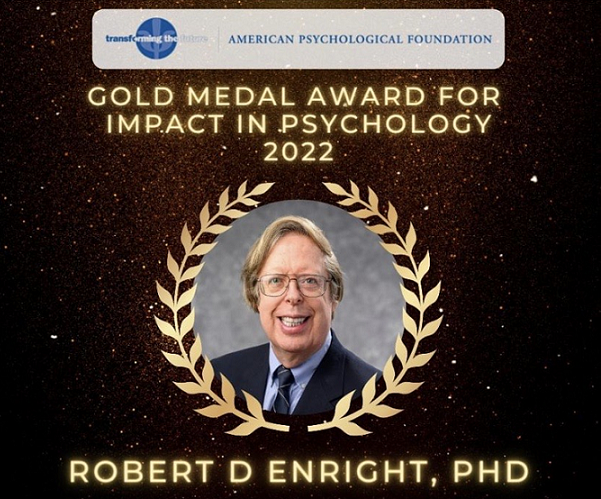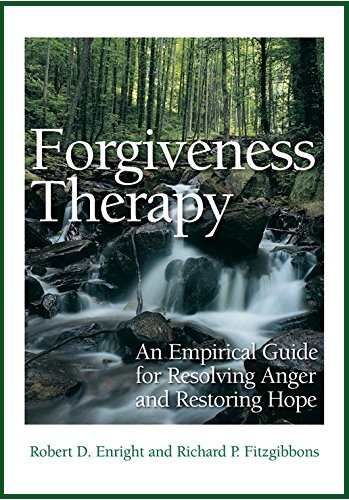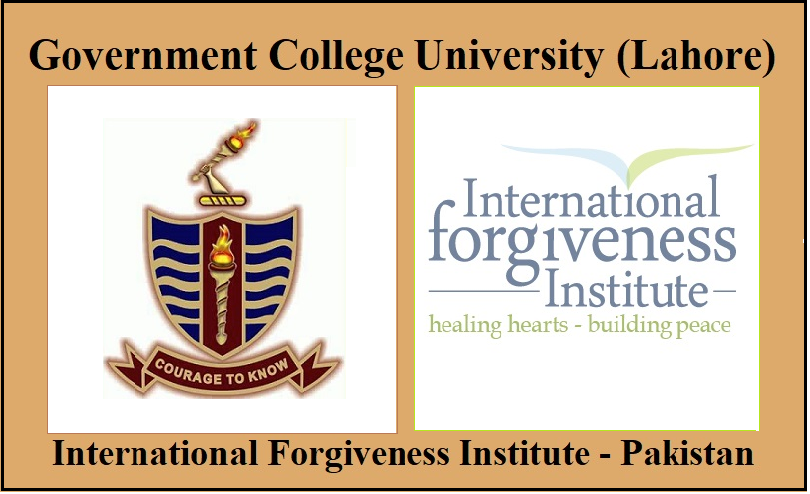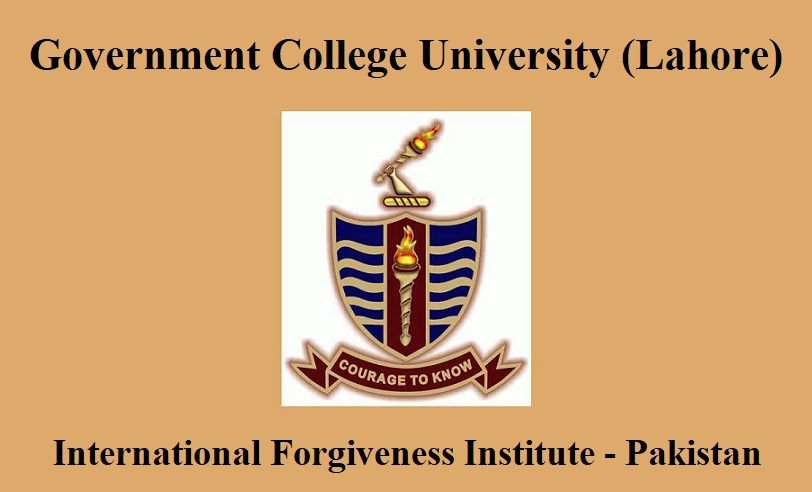Tagged: “moral virtue”
“Forgiveness Pioneer” Wins Inaugural Gold Medal Award for Impact in Psychology
The scientific application of forgiveness, forgiveness education, and forgiveness therapy is being singled out for its “game-changing impact on the field of psychology” by the country’s largest and oldest organization of doctoral-level psychologists.
The American Psychological Foundation (APF), the grant-making arm of the American Psychological Association (APA), has just announced the winner of its first-ever Gold Medal Award for Impact in Psychology—Dr. Robert Enright, a professor of Educational Psychology at the University of Wisconsin-Madison, and founder of the International Forgiveness Institute.
Classified as one of psychology’s highest honors, the award “recognizes a psychologist whose work has had a game-changing impact on the field of psychology,” according to APF board president Terence M. Keane, PhD. He added that the new award acknowledges “a psychologist’s body of work that has been impactful, innovative, and transformational.”
Prior to this year, the award was called the Gold Medal Award for Life Achievement and it has been bestowed on exceptional psychological innovators by the APF for the past 65 years. Previous winners have included B. F. Skinner (the 1971 winner who developed behavior analysis), Harry Harlow (the 1973 winner and a UW-Madison psychologist like Dr. Enright), Rollo May (1987), Mary Ainsworth (1998), and Albert Bandura (2006).
“For the APA and the APF to position forgiveness alongside the creative achievements of those giants in the field of psychology is truly a profound pronouncement,” Dr. Enright said after learning of his recognition.
 As a grant making foundation, the APF helps fund psychologists and students worldwide who are using psychology to address major issues and improve lives. The APA has more than 133,000 members—doctoral-level researchers, educators, clinicians, consultants, and students (associate members). Combined, the two organizations have more than 500 staff members who focus on providing services to psychologists like Dr. Enright who have dedicated their lives to improving the mental health and welfare of others.
As a grant making foundation, the APF helps fund psychologists and students worldwide who are using psychology to address major issues and improve lives. The APA has more than 133,000 members—doctoral-level researchers, educators, clinicians, consultants, and students (associate members). Combined, the two organizations have more than 500 staff members who focus on providing services to psychologists like Dr. Enright who have dedicated their lives to improving the mental health and welfare of others.
Dr. Enright, a licensed psychologist, has devoted 37 years to the scientific study of forgiveness. As the unquestioned pioneer in the field of forgiveness, Dr. Enright published the first social scientific journal article on person-to-person forgiveness and the first cross-cultural studies of interpersonal forgiveness. He also pioneered forgiveness therapy and developed an early intervention to promote forgiveness–the 20-step “Process Model of Forgiving.”
The Enright Forgiveness Inventory (EFI), an objective measure of the degree to which research participants forgive another who has been unjust and hurtful toward them, is now used by researchers around the world. The Enright Forgiveness Inventory for Children (EFI-C), the Enright Self-Forgiveness Inventory (ESF-I), and the Enright Group Forgiveness Inventory (EGFI) have all become standard research tools known simply by their abbreviations.
Dr. Enright also pioneered the use of forgiveness therapy in clinical practice by developing  interventions that gained critical acclaim with the APA’s publishing in 2015 of Forgiveness Therapy, an instructional manual for clinicians written by Dr. Enright and psychiatrist Richard Fitzgibbons, MD. The two authors were selected in 2019 as recipients of the prestigious Expanded Reason Award presented by the University Francisco de Vitoria (Madrid, Spain) in collaboration with the Vatican Foundation Joseph Ratzinger/Benedict XVI (Rome, Italy) “to recognize and encourage innovation in scientific research and academic programs.”
interventions that gained critical acclaim with the APA’s publishing in 2015 of Forgiveness Therapy, an instructional manual for clinicians written by Dr. Enright and psychiatrist Richard Fitzgibbons, MD. The two authors were selected in 2019 as recipients of the prestigious Expanded Reason Award presented by the University Francisco de Vitoria (Madrid, Spain) in collaboration with the Vatican Foundation Joseph Ratzinger/Benedict XVI (Rome, Italy) “to recognize and encourage innovation in scientific research and academic programs.”
Dr. Enright’s ambitious approach to forgiveness education included the development of 14 Forgiveness Education Curriculum Guides for students in grades Pre-K through 12th. Through stories, children learn about the five moral qualities most important to forgiving another person–inherent worth, moral love, kindness, respect and generosity—and eventually, how they themselves can become a forgiving person.
A just-completed meta-analysis by University of Wisconsin-Madison researchers involving more than 1,500 students in 10 countries shows that students enrolled in Forgiveness Education Programs demonstrated reduced anger and increased forgiveness toward those who have hurt them. Those forgiveness guide lesson plans, distributed through the IFI, have been requested by educators in more than 30 countries and contentious regions around the world.
 Adding to its forgiveness education agreements with many of those countries, the IFI’s newest Branch Office is IFI-Pakistan, a partnership with the Government College University Lahore, Lahore, Pakistan–the first in that country and in Southern Asia. In Greece the IFI has trained more than 600 grade school instructors in the past 8 years who are now teaching forgiveness to more than 6,000 Greek students.
Adding to its forgiveness education agreements with many of those countries, the IFI’s newest Branch Office is IFI-Pakistan, a partnership with the Government College University Lahore, Lahore, Pakistan–the first in that country and in Southern Asia. In Greece the IFI has trained more than 600 grade school instructors in the past 8 years who are now teaching forgiveness to more than 6,000 Greek students.
“Although the virtue of forgiveness has made astronomical strides in the past few decades, we are just on the edge of what it can offer us for the future,” Dr. Enright says. “Forgiveness must have a seat at the peace-keeping and peace-making table.”
According to Dr. Enright, his body of work has clearly demonstrated that as people forgive, they become less angry, less depressed, less anxious, and more hopeful of their future. In other words, people become more peaceful within themselves, making the possibility of peace with others more likely.
Dr. Enright has outlined his grass-roots approach to peace through a variety of forums beginning with his 2010 article “Forgiveness Education as a Path to Peace,” his 2014 address to the United Nations Population Fund “Forgiveness as a Peace Tool,” and his recent series of 3 essays on peace published on the Psychology Today digital website.
In 2015, Dr. Enright accompanied Eva Mozes Kor, a survivor of the Holocaust, on a series of US radio interviews to promote peace through forgiveness. His peace initiatives have earned him peace educator awards including being named a Paul Harris Fellow by Rotary International in 2016.
Time magazine has called Dr. Enright “the forgiveness trailblazer.” The Los Angeles Times said Dr. Enright is “the guru of what many are calling a new science of forgiveness.” The Christian Science Monitor called Dr. Enright “the father of forgiveness research.”
As the recipient of the 2022 Gold Medal Award for Impact in Psychology, Dr. Enright will be honored during APA 2022–the annual American Psychological Association convention on August 5th in Minneapolis, MN. He will receive a gold medal plaque and a modest honorarium during the APF Friends of the Foundation reception.
Forgiveness seems to be a problem for people who have been traumatized. I say this because upon forgiving, the person may mistakenly assume that the relationship needs to be restored. Do you agree?
I do not agree primarily because to forgive is very different from reconciling with an abusive person. Reconciliation is not a moral virtue. Instead, it is a negotiation strategy of two or more people coming together again in mutual trust. You can forgive (being good, even from a distance, to those who are not good to you) and still not reconcile. As you say, when a person “mistakenly assumes” that the relationship needs to be restored, this is an error that needs to be corrected for the protection of the abused person.
The Missing Piece to the Peace Puzzle – FORGIVENESS
While Russia’s invasion of Ukraine is invoking unwelcome recollections of previous territorial wars, an international multidisciplinary team of researchers that has been meeting since 2014 is discovering what makes some societies more peaceful than others. One of the crucial elements for promoting peace and nonviolence, they say, is an individual’s capacity for forgiveness—a concept International Forgiveness Institute co-founder Dr. Robert Enright has been espousing for decades.
“We launched our first peace initiative in 2002 when we began teaching forgiveness education in Belfast, Northern Ireland,” Dr. Enright recalls. “I was convinced back then, and I believe even more so now, that forgiveness is the missing piece to the peace puzzle. These study results are nothing new.”
During his 35+ years of studying the virtue of forgiveness, Dr. Enright has repeatedly demonstrated that as people forgive, they become less angry, less depressed, less anxious, and more hopeful of their future. In other words, people become more peaceful within themselves, making the possibility of peace with others more likely. He outlined his grass-roots approach in this 2010 article: Forgiveness Education as a Path to Peace. Read Dr. Enright’s latest blog for Psychology Today, Forgiveness as a Missing Piece to Peace Between Ukraine and Russia.
The study results about crucial elements for peace come from a team of experts that is part of the Advanced Consortium on Cooperation, Conflict, and Complexity (AC4), a multidisciplinary research institute based at Columbia University in New York City. AC4 is a unit of the university’s Earth Institute which is made up of scholars spread across 35 research centers and programs encompassing more than 850 scientists, students, postdoctoral fellows and staff.
The group’s mission is to employ models and methods from complexity science (a branch of applied mathematics) to study the dynamics of peaceful societies with the goal of “revolutionizing peace and conflict resolution.” AC4 research has identified and studied more than 80 internally peaceful societies around the globe and identified their common characteristics including:
- abundant forgiveness reservoirs that help mitigate anger, fear, and negativity; and,
- higher levels of capacity for forgiveness that can lead to the endorsement of peace beliefs.
Working together with organizations like the United Nations (UN), the International Peace Institute, and The World Bank, AC4 is exploring various models (i.e., the role of forgiveness, victim memory, and reconciliation) in the actual peace process in countries like Colombia, Israel-Palestine, and Afghanistan. In the process, they are generating and promoting new practical, transdisciplinary, evidence-based approaches to peace.
Like AC4, the International Forgiveness Institute (IFI) has also collaborated with peace-seeking organizations going as far back as 1999 when Roy Lloyd, IFI Board President, was part of a delegation led by the Rev. Jesse Jackson that traveled to Belgrade, Yugoslavia (now Serbia). That delegation not only gained the release of three American soldiers captured during the Kosovo Conflict but also urged Yugoslavian President Slobodan Milosevic to accept a UN offer to establish a foreign peacekeeping force in Kosovo.
In 2014, Dr. Enright laid the foundation for “Forgiveness as a Peace Tool” at a 2-day work session hosted by the United Nations Population Fund (UNFPA) in New York City. Dr. Enright, a University of Wisconsin educational psychology professor, was named to serve on a UN international “Expert Group” that was established to begin developing intervention models aimed at ending gender-based violence around the world. Three weeks later, delegates at the United Nations Peace Conference in Geneva, Switzerland, resolved that “justice and forgiveness” are essential tools in peacebuilding.
“Peace is not a goal to be reached but a way of life to be lived.”
Archbishop Desmond Tutu
Nobel Peace Prize-winning South African Anglican cleric;
25+ years Honorary Board Member – IFI
More recently, Dr. Enright last fall negotiated the establishment of the International Forgiveness Institute’s newest partner, IFI-Pakistan. That Branch Office is housed at the Government College University Lahore (GCU-Lahore, Pakistan) and is the first of its kind in Pakistan and in Southern Asia. The unit will function in collaboration with the IFI with the mission of developing and disseminating forgiveness interventions and methodologies throughout the country.
“Because only a few psychologists have expertise in this field in Pakistan, we can now offer an accredited course teaching forgiveness psychology,” said GCU Vice Chancellor Dr. Asghar Zaidi, in announcing the partnership. “Forgiveness liberates us from anger, resentment, bitterness, and destructive behavioral patterns that are prevalent in our society.”
partnership. “Forgiveness liberates us from anger, resentment, bitterness, and destructive behavioral patterns that are prevalent in our society.”
Dr. Enright has been working since 2016 with Dr. Iffat Batool, a GCU psychology professor, who has tirelessly pursued creation of the unit. Pakistan was one of the seven countries that conducted research and validation on Dr. Enright’s new research tool, the Enright Forgiveness Inventory-30 and several of Dr. Enright’s research tools have already been translated into Urdu, one of the two official languages of Pakistan (along with English). A request is also pending to get the publisher’s approval to translate Dr. Enright’s book 8 Keys to Forgiveness into Urdu for use with GCU’s “Forgiveness Psychology and Practice” course.
Dr. Enright is also working closely with the National Director of the Liberia Forgiveness Education Program (that the IFI established 10 years ago after the country’s civil war finally concluded) to implement forgiveness interventions that could help with reconciliation efforts between the various factions: Can Group Forgiveness in Liberia Lead to Peace? His peace efforts in other parts of the world are outlined on the IFI website at Peace Education Goals.
Learn More:
- Interactive Sustainable Peace Casual Loop Diagram (AC4 Sustainable Peace Project)
- How to Live in Peace? Mapping the Science of Sustaining Peace (American Psychologist)
- The Sustainable Peace Mapping Initiative (Columbia University)
- Contribute to the realization of sustainable peace. Support the IFI with a charitable gift.
Correcting Forgiveness Misconceptions and Distortions
Misconceptions and distortions are nothing new to most professionals—particularly to the professionals who employ forgiveness interventions and forgiveness therapy. Since the first empirically based study on person-to-person forgiveness was published in the social sciences (Enright et al., 1989), there has been vigorous debate on exactly what forgiveness is and is not.
That debate has generally been positive and helpful in the overall evolution of forgiveness from a simple concept (and primarily a religious credo) to a vitally important mental health approach for many people who have been victimized. At the same time, there still are a few in the mental health professions who are criticizing forgiveness with some good points but also with some errors.
Those who dispense misinformation about forgiveness prevent many individuals from
choosing forgiveness when they could truly benefit from deep emotional recovery.
Dr. Robert Enright
Dr. Enright, co-founder of the International Forgiveness Institute (IFI) and the man labeled “the forgiveness trailblazer” by Time magazine, has been using scientific research methods to study forgiveness for more than 35 years. Whenever he learns about an inaccurate or erroneous premise that is being circulated, he tries to address it head-on. That’s exactly what he did just this week by factually countering an essay published on Feb. 20 in Psychology Today.
The essay, “Why Forgiveness Isn’t Required in Trauma Recovery,” was written by a Chicago psychotherapist who is also a speaker and author. While acknowledging that “I’ve witnessed the benefits of forgiveness for many of my clients,” the author’s main contention is that “forgiveness is potentially problematic when incorporated into trauma treatment.”
While Dr. Enright says he has heard all those erroneous assertions before, he quickly drafted his own essay providing fact-based and true-to-life counter arguments for each of the claims. His goal in doing so, he says, was not to heavily criticize, but instead “to protect the integrity of a genuine process of forgiveness, free of confusions of what forgiveness is and is not.”
Dr. Enright’s critique of the original essay was published on Feb. 26 by Psychology Today. While the publication gave his clarifying discourse the same title as the original Feb. 20 article, it added a significant subtitle, “Why Forgiveness Isn’t Required in Trauma Recovery: Published misconceptions of forgiveness may discourage people from trying it.”
The blog essay by “the father of forgiveness research” (the title bestowed on Dr. Enright by The Christian Science Monitor) provides 5 succinct and factual responses to the original article’s 5 contentions. It also clarifies two points on which he agrees with the article: 1) “forgiveness after unjust behaviors is not necessarily for everyone;” and, 2) “as a moral virtue, forgiveness never ever should be forced onto anyone.”
Dr. Enright is no stranger to Psychology Today. In fact, in the past 5 years he has penned nearly 100 blog essays as part of his own dedicated column for the publication’s website called “The Forgiving Life.” Those blog posts have been accessed online more than a million times–an average of 548 times per day since he began writing them.
According to Dr. Enright, he will continue his efforts to provide information to Psychology Today readers and he will continue to clarify points when there appear to be misunderstandings about forgiveness and forgiveness therapy so that both therapists and clients can make informed decisions.
LEARN MORE:
- Read the original article: “Why Forgiveness Isn’t Required in Trauma Recovery”
- Read Dr. Enright’s critique of that article: “Published Misconceptions of Forgiveness May Discourage People from Trying It”
- View Dr. Enright’s “Top Ten Psychology Today Blogs”
- Access all of Dr. Enright’s “Psychology Today Blogs“
Is it possible for someone to actually improve in forgiveness? If so, what do you suggest as some keys for me to do that?
Forgiveness is not a superficial action (such as saying, “It’s ok” when someone is unfair to you). Instead, it is a moral virtue, as is justice and kindness and love. Aristotle told us thousands of years ago that one challenge in life is to become more perfected in the virtues. In other words, we do grow more proficient in our understanding and expression of the virtues, but only if we practice them. It is a struggle to grow in any virtue, including forgiveness. So, first be aware that you can grow in this virtue. Then be willing to practice it, with the goal of maturing in love, which is what forgiveness is (loving those who are unkind to us). You need a strong will to keep persevering in the struggle to grow in forgiveness. In sum, you need: understanding of what forgiveness is, practice, a strong will, and keeping your eye fixed on the goal of improving in love a little more each day.



